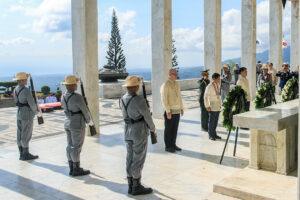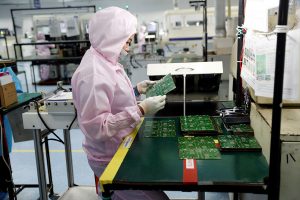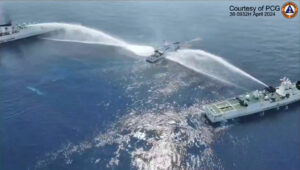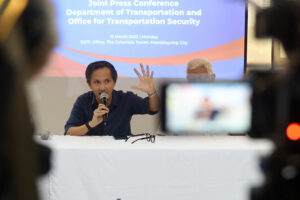US taking ‘bold new steps’ to quicken progress of alliance with Philippines

By Kenneth Christiane L. Basilio and Adrian H. Halili, Reporters
THE US is taking bold new steps to accelerate its military partnership with the Philippines, an American envoy said on Wednesday, citing the alliance as a “pillar of security” in the Indo-Pacific region.
“As Secretary of Defense Hegseth announced a few weeks ago, we are taking bold new steps to accelerate the progress of the alliance,” US Deputy Chief of Mission Y. Robert Ewing said in a speech at a Day of Valor ceremony in Bataan province livestreamed on Facebook.
“Today, the US-Philippine alliance stands as a pillar of security and stability in the Pacific. Our forces work shoulder to shoulder, 365 days a year to advance our shared goal of a free and open Indo-Pacific where international law is respected,” he added.
The Day of Valor, a national holiday, commemorates the fall of Bataan and the resistance on Corregidor Island against Japanese troops during World War II.
Mr. Ewing said the shared experience of the US and Philippines during and after the war forged unbreakable bonds. “These bonds are now the foundations of the ironclad US-Philippine alliance.”
Last month, US Defense Secretary Peter Brian Hegseth visited Manila where he vowed to help arm the country with deterrence capabilities by deploying advanced weaponry, such as an anti-ship missile system and unmanned sea vessels to counter China’s aggression in the South China Sea.
Mr. Ewing said the US is also keen on deepening cooperation on cyber-defense to reduce the Philippines’ vulnerabilities, increase security and enable more advanced operational cooperation.
US and Philippine forces are set to hold Balikatan (shoulder-to-shoulder) exercises later this month until the first week of May.
For his part, Japanese Ambassador to the Philippines Endo Kazuya said the Philippines holds a critically strategic position for Japan and the entire region because it is situated in “a vital sea lane and a crossroad of geopolitical significance.”
“The current global security landscape is fraught with challenges,” Mr. Endo said in a speech at the same event. “Unilateral attempts to change the status quo by force continue to intensify, creating a complex and uncertain environment.”
He added that Japanese and Philippine relations have reached “unprecedented levels,” demonstrated by their shared efforts to enhance security and law enforcement capabilities.
China and the Philippines have been at loggerheads over confrontations near disputed features in the South China Sea, with Manila accusing China’s coast guard of aggression and Beijing furious over what it calls repeated provocations and incursions.
A United Nations-backed tribunal based in The Hague in 2016 voided China’s claim to more than 80% of the South China Sea, where more than $3 trillion worth of trade passes through each year, for being illegal.
At the same event, Philippine President Ferdinand R. Marcos, Jr. cited the need to boost peace-building cooperation with other countries to stop more wars from happening.
“The lessons we have learned teach us that the solution to war is not more war, but peace,” he said in a speech. “Peace cannot be attained by a single person or a single country. We must bring together all parties involved. These are the lessons we hope to have learned.”
PHL-AUSTRALIA TALKSMeanwhile, top generals of the Philippine and Australian armies concluded on Tuesday a two-day meeting in Manila, where they discussed ways to deepen security ties, including possible joint military exercises in the next two years.
In a statement, the Philippine Army said they held talks with their Australian counterparts to boost defense cooperation and security ties amid China’s expansive claim in the South China Sea.
Philippine Army acting Chief-of-Staff Ferdinand B. Napuli met with Australian Army Deputy Chief-of-Staff Chris Smith and Australia’s defense attache to the Philippines Emma McDonald-Kerr at Fort Bonifacio, the army’s headquarters in the Philippine capital.
The military officials discussed activities that the Philippines and Australian armies could do in the next two years, such as “combined arms training” to help enhance interoperability.
“The activity’s outcome reflects both armies’ shared commitment and collaborative efforts and will serve as a powerful reminder of the importance of regional unity in ensuring security and stability,” Mr. Napuli said in the statement.
The meeting between the Philippines and Australia came on the heels of Manila’s recent string of defense engagements with Canada, Japan and coincided with ongoing joint military drills between Philippine and US forces ahead of the annual Balikatan exercises.
Australia’s Defense department on Monday said military training activities between Manila and Canberra’s forces are set to increase this year, signaling deeper military ties between the two nations.
The Armed Forces of the Philippines and Australian Defense Force will conduct more than 20 training drills and military exchanges in a program called the Joint Australian Training Team-Philippines this year, “more than doubling the number delivered in 2024,” it added.
“The Philippines is one of Australia’s most important regional defense partners, and we share a commitment to a peaceful, stable and prosperous Indo-Pacific region,” Australia Defense department Chief of Joint Operations Justin Jones said in the statement.
The Philippines is boosting security ties with western nations and regional allies in the eastern hemisphere, including Australia, as they grapple with tensions involving China, such as Manila’s sea disputes and Canberra’s spying concerns.
Philippine forces have repeatedly sparred with Chinese ships and aircraft in the South China Sea over competing claims on Spratly Islands and Scarborough Shoal, among other sea features. Beijing asserts sovereignty over almost the entire sea based on a 1940s nine-dash line map that overlaps with the maritime zones of the Philippines, Brunei, Malaysia, Taiwan and Vietnam.
Australia expressed concerns with China in February after the People’s Liberation Army Navy conducted live-fire drills in international waters within the Tasman Sea — more than 8,000 kilometers away from Hainan Island, China’s nearest major landmass — which separates Australia and New Zealand.
China did not inform the Australian government of its planned exercise, leading to some commercial planes having to change their flight plans, Reuters reported.
Political analysts said the Philippines could benefit from deeper security ties with Japan and the US, as the country seeks to modernize its armed forces.
“As a security partner, the Philippines will have preferential treatment to procurement and acquisition of military material to improve our military modernization,” Chester B. Cabalza, founding president at think tank International Development and Security Cooperation in Manila, said in a Facebook Messenger chat.
He said Manila would benefit from both countries’ advanced weapon system, war experience, interoperability and strategies.
Philippine President Ferdinand R. Marcos, Jr. earlier said he would ensure funding to fast-track the country’s military modernization program before his term ends in 2028. The government has allotted $35 billion in the next decade for its modernization plan.
“The US and Japan can help the Philippines more in the South China Sea by pursuing functional cooperation and the peaceful settlement of disputes with China and other parties,” Rommel C. Banlaoi, chairman of the Philippine Institute for Peace, Violence and Terrorism Research, said in a Viber message.
The Philippines has been seeking more foreign defense deals with countries like the US, Japan, Australia and Canada amid worsening tensions with Beijing in the South China Sea.
“The trilateral defense cooperation with Japan and the US is founded on common security, confidence building mechanisms, and treaty alliance to allow reciprocal and visiting military forces,” Mr. Cabalza said.
Michael Henry Ll. Yusingco, a fellow at the Ateneo de Manila Policy Center, said the Philippines should learn to be more self-reliant in its defense capabilities instead of relying on alliances.
“The national security narrative should be shifting now,” he said via Messenger chat. “The public’s attention should be focused on the challenges that must be overcome to establish a self-reliant defense posture. The constant edifying of these defense alliances fosters a dependency mentality amongst the population.”
He added that for the Philippines to be fully independent, taxpayers should “accept the burden of paying for the cost of establishing a self-reliant defense posture.”
“Taxpayers, in particular, should now accept that they will have to shoulder the bill for this initiative to be truly successful,” Mr. Yusingco said. “This is the fact that is always lost when defense pacts with stronger nations are elevated to a higher status in the public discourse.”




